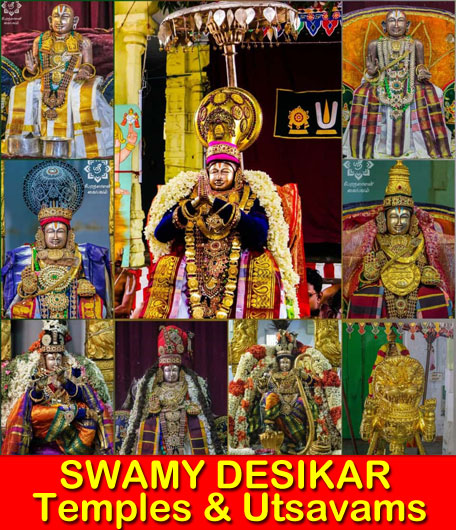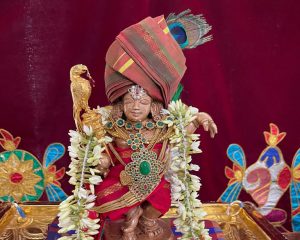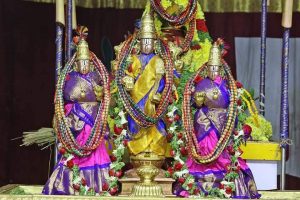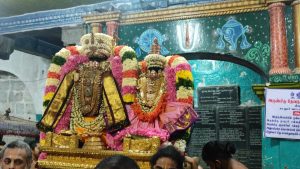Sri Vedanta Desika has done hundreds of works during his illustrious life time. The Paduka Sahasram authored by him is one of the greatest works which runs into 1008 verses. Swami Desika composed these verses in a single night. This work speaks of multifaceted qualities of the Padukas (sandals) of Lord Ranganadha of Srirangam.
It is said that the Lord was so greatly pleased with Nammazhwar’s Tiruvaimozhi that he desired and inspired Swamy Desika to return his gratitude to the Azhwar in the form of Paduka Sahasram.
The main theme of the work centers round the sandals of Sri Rama which were given to Bharatha by the Lord himself. It is Swamy Desikan’s contribution to Nammazhwar, who is god’s holy feet personified, and also known as Sri Shataree. It has Prapathi or Saranagathy, abject surrender to god, as its central theme.
Swamy Desikan followed a unique method of classifying the contents of this Mahakavya. Previously authors used to divide them into Sargas, Sthabakas or Kandas. He divided them into Paddatis. Paddati means route or path. It is a significant classification in that each path refers to the course the sandals of the Lord chooses to take.
The Paduka Sahasram ensures welfare and moksha for all. In his Tiruvaimozhi, Nammazhwar writes about the significance of Padukas and says those who worship the Padukas will be relieved of all troubles. In the same way, Desika too has mentioned that reciting Paduka Sahasram will ensure peace, prosperity and Moksha.
At Sri Rangam, a scholar, who wanted to defeat Desika, challenges him to write 1,000 slokas on Lord Ranganadha within a night to justify his title Kavitarkika Simha. With modesty, Desika told the scholar that he did not want any award and did not want to involve himself in any competition. Instead, he preferred Bhagavat Kainkaryam only. But the scholar insisted that he would write 1,000 slokas about the Lord’s feet (Paadas), and Desika should also write 1,000 slokas. Desika was reluctant to compete, but when the priest placed Sri Sathari on his head, Desika had a divine feeling and suddenly he accepted the challenge. This happened, thanks to the effect of Nammazhwar, who is in the form of Sri Sathari. Later Desika went to sleep thinking that he will write hymns. When the scholar saw Desika fast asleep, he wrote 300 slokas with difficulty and went to sleep happily.
Suddenly Desika woke up to the sound of movement of Padukas, and wrote 1,000 slokas in beautiful and grammatical verses. This is named ‘Paduka Sahasram’. The next morning, Desika took his work to Lord Ranganadha temple. The scholar was also present there. He said Desika had not written anything and he should be relieved of the title Kavitarkika Simha and the honour should be bestowed on him. The scholar submitted his 300 slokas to the Lord. After that, Desika with humility, submitted his 1008 slokas written in 32 Paddathis to Lord Ranganadha. An elated Ranganadha appeared with his consort, and bestowed the award of Kavitarkika Simha on Swami Desika. The scholar was astonished at the power of Desika and sought apology. Then Desika told the scholar that he had written about Padukas but the scholar had written about Padas. Desika said the scholar’s work is better than that of his work because Padukas will be below Padas only. Everyone present there lauded the benevolence of Desika. When they asked Desika how such humility is possible, Desika said serving with clean heart is the principle of Sri Ramanuja. So serving god without any corruption in mind is important. He said he did not want the honour of Kavitarkika Simha, instead he preferred to be called ‘Paduka Sevaka’, which will realise his life ambition.
32 Paddathis
Paduka Sahasram has 32 Paddathis (systems) and in this classification he is understood to have thought about 32 Brahma Vidyas which are said to be the various means of getting to his lotus feet. Each Paddathi has different benefit.
By reciting Prastava Paddathi, one can get meaningful knowledge. Samakhya Paddathi will ensure reverence; Prabhana Paddathi will provide government job and promotion; Samarpana Paddathi will free us from unnecessary blames; Pratiprasthana Paddathi will fulfill all wishes; Adhikara Parigraha Paddathi will bestow on us power; Abhisheka Paddathi will lead to world peace; Niryatana Paddathi will ensure self-sufficiency; Vaitalika and Sringara Paddathi will pave way for a disease-free life; Sanchara Paddathi will give the benefit of visiting holy places; Pushpa Paddathi will bestow on us the benefit of Pushparchana to God; the recital of Paraga Paddathi will give good intellect; Nada Paddathi will improve vocal and inductive power; Ratna Samanya, Bahu Ratna, Padma Raaga, Mukta, Marakatha, Indraneela, Kanchana Paddathis will bestow the benefit of business development; Bimba Pratibimba Paddathi will provide good children; Sesha Paddathi will ensure the benefit of service of Lord; Dwandwa Paddathi will lead to successful marriage; Samnivesa Paddathi wil bless us with wisdom; and Mantrika Paddathi will ensure money, food and prosperity.
Those who recite Rekha and Subhashita Paddathi will succeed in exams with top rank. Prakeerna Paddathi will ensure all benefits. Chitra Paddathi will make us good leaders. Nirveda Paddathi will free us from wish, anger and jealousy. Phala Paddathi will ensure Moksha.
In his Paduka Sahasram, Desika has incorporated the entire meaning of Vedanta. The recital of this sloka confers moksha and comfort. The Padas of Lord Ranganadha save the entire world. And the Padukas protect the Padas. Though number only two, the Padukas have many qualities. They are the safeguard to all of us. The recital of Paduka Sahasram is equivalent to the reading of the Ramayana. The god of Paduka Devi, Lord Ranganadha, will offer His blessings to all of us.
People are suffering due to the ill-effects of Kali. Let us recite Desika’s Paduka Sahasram and overcome all the hurdles with the help of Lord Ranganadha.
“Kavitarkika Simhaaya, kalyana Gunasaline,
Srimate Venkatesaya Vedaanta Gurave Namaha:”
-TSR








